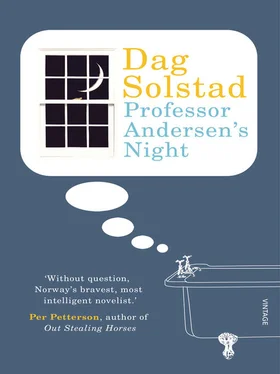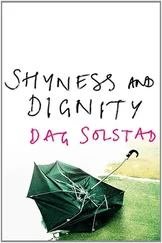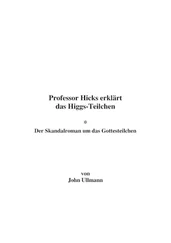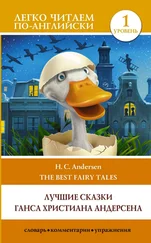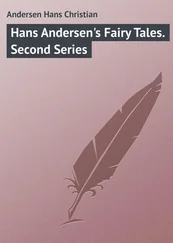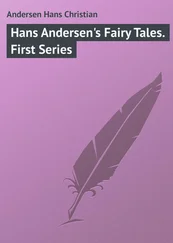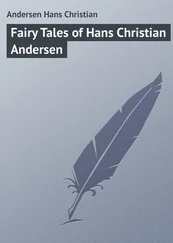Dag Solstad - Professor Andersen's Night
Здесь есть возможность читать онлайн «Dag Solstad - Professor Andersen's Night» весь текст электронной книги совершенно бесплатно (целиком полную версию без сокращений). В некоторых случаях можно слушать аудио, скачать через торрент в формате fb2 и присутствует краткое содержание. Год выпуска: 2011, Издательство: Harvill Secker, Жанр: Современная проза, на английском языке. Описание произведения, (предисловие) а так же отзывы посетителей доступны на портале библиотеки ЛибКат.
- Название:Professor Andersen's Night
- Автор:
- Издательство:Harvill Secker
- Жанр:
- Год:2011
- ISBN:нет данных
- Рейтинг книги:3 / 5. Голосов: 1
-
Избранное:Добавить в избранное
- Отзывы:
-
Ваша оценка:
- 60
- 1
- 2
- 3
- 4
- 5
Professor Andersen's Night: краткое содержание, описание и аннотация
Предлагаем к чтению аннотацию, описание, краткое содержание или предисловие (зависит от того, что написал сам автор книги «Professor Andersen's Night»). Если вы не нашли необходимую информацию о книге — напишите в комментариях, мы постараемся отыскать её.
Professor Andersen fails to report the crime. The days pass, and he becomes paralysed by indecision. Desperate for respite, the professor sets off to a local sushi bar, only to find himself face to face with the murderer.
Professor Andersen's Night
Professor Andersen's Night — читать онлайн бесплатно полную книгу (весь текст) целиком
Ниже представлен текст книги, разбитый по страницам. Система сохранения места последней прочитанной страницы, позволяет с удобством читать онлайн бесплатно книгу «Professor Andersen's Night», без необходимости каждый раз заново искать на чём Вы остановились. Поставьте закладку, и сможете в любой момент перейти на страницу, на которой закончили чтение.
Интервал:
Закладка:
They sat around the dinner table. The starter had been consumed. The main course was being carried in. Grouse. Nina pointed out that the peas which accompanied the dish were Russian, and that it had been terribly difficult to get hold of them in this country. You see, there was actually only one single shop in the whole of Oslo where it was possible to get hold of Russian peas, and then you really ought to have ordered them in advance. Professor Andersen was then able to remark that he knew the shop Nina was referring to extremely well, he himself often purchased fish there, and then he had not infrequently heard other customers asking for Russian peas. He urged the others to guess which shop it might be. He did that to change the topic of conversation which had lasted throughout the starter, indeed right from the moment they were standing with an aperitif in their hands before the meal. What had happened was this; some days ago, just before Christmas, the very first programme by Judith Berg’s daughter, Ingrid Guida, a new entertainment show called Guida , had been on TV, and on the NRK, the Norwegian Broadcasting Corporation, no less, so it was not surprising that it was subject to comment at this party, especially as one of the guests was the presenter’s mother, and since the programme had received sensationally good reviews, it was natural to congratulate Judith Berg warmly, while they stood with their aperitifs in their hands. But this entertainment programme had also been discussed all through the starter, something that would have been fine in a way, if it weren’t for the fact that only Per Ekeberg, Trine Napstad and Judith Berg had seen the programme; Professor Andersen hadn’t seen it, Nina and Bernt hadn’t seen it, and Jan Brynhildsen had also been prevented from seeing it, since he had been standing on the main stage of the National Theatre that evening; as a result they had ended up discussing an entertainment programme on TV which only a minority had seen and consequently could have an opinion on. But that did not trouble Per Ekeberg or Trine Napstad or Judith Berg. They had conducted an elated conversation about it, which the others more or less just had to follow, without contributing anything much. That was why Professor Andersen now attempted to steer the conversation towards something else by asking if the others could guess which shop it was in Oslo that was the only one that stocked Russian peas. Fjellberg, was the immediate reply from Jan Brynhildsen, and as a result the conversation about Guida resumed. For Trine Napstad had more to say about the entertainment programme on TV, as did Per Ekeberg too, of course, and Judith Berg wanted nothing more than to hear admiring comments about, and especially intelligent praise of, her daughter’s success as a TV presenter. Now it wouldn’t have been any trouble for Bernt Halvorsen, as the host, to lead the discussion on to another topic in a discreet manner, but he didn’t. With a question for those of them who had seen it, from one who unfortunately hadn’t seen it, he gave a hint to the rest of them who hadn’t seen it that the conversation about this programme should continue, and that it was up to them to take part, using whatever means they had at their disposal. More than likely Bernt chose to do this as a token of consideration towards Judith. It was, after all, her big night, and it wasn’t going to be spoiled by him, the host, disregarding her by signalling that they ought to talk about something else. Professor Andersen thought that Bernt probably had assumed it would be tactless. Perhaps his decision had also been reached following Judith’s answer, when Trine Napstad had asked, responding to the fact that Jan Brynhildsen hadn’t seen the programme because he was on stage when it was shown: ‘But haven’t you seen it on video afterwards?’ Then Judith had said that she hadn’t recorded it on video, ‘because I think there are limits to how much interest I should show in my daughter’s affairs’. Professor Andersen had liked that answer, and Bernt Halvorsen probably had, too; it showed great modesty and a sense of decency, despite being in a sphere where one wouldn’t be observed by other people, apart from Jan Brynhildsen, her husband, that is. Obviously she was proud, her face glowed tonight, but nevertheless she had managed to fight back her urge to dwell on her daughter’s success. From the admiring comments, congratulations and genuinely interested questions which Per Ekeberg and Trine Napstad put to Judith Berg about how the programme would be continued next Friday, Professor Andersen, and the other three who hadn’t seen it, formed an impression of the kind of programme which had been so successful for Ingrid Guida, so that both he and the three others who hadn’t seen it could take part in the conversation about it now and then, both with questions, comments and also astonished exclamations. Guida was a programme that centred around the 23-year-old presenter’s personality, and celebrities from the fields of Norwegian politics, finance, culture and entertainment were her guests, bowing and scraping to her, allowing themselves to be depicted as walk-on characters in staged and bizarre episodes. She persuaded priests in sequins to dance behind her up the aisle in Oslo Cathedral, for instance, or doctors along the hospital corridors. She was the seducer who got the pillars of society to break out of their roles and profane them. She coaxed ministers of State to dress up in costumes making fun of themselves, and to strike poses which everyone would have thought embarrassing for them, if it wasn’t for the fact that they let themselves be stage-directed into them, something that led Professor Andersen, who hadn’t seen the programme, to exclaim: ‘But then they must lose their sting, surely,’ while Bernt Halvorsen, in response to almost everything he heard, exclaimed: ‘No, that surely isn’t possible,’ which made Per Ekeberg, Trine Napstad or Judith Berg laugh and relish the situation, as they had seen the programme and could assure them that it really was possible, yes, everything was possible, even though Bernt Halvorsen with his ‘No, that surely isn’t possible’ had only meant to be polite and obliging, and was certainly not expressing his intensely curious incredulity towards a programme he hadn’t seen, and probably didn’t intend to see next Friday either, while in response to Professor Andersen’s outburst Per Ekeberg retorted sharply: ‘This has nothing to do with sting, it is displaying a lifestyle.’
By that time they had almost finished their grouse, served with a delicious savoury sauce, and the aforementioned Russian peas. And at this point in the meal Nina, their hostess, disclosed to the dinner party that she now had begun to wonder if it hadn’t been a mistake to serve Rioja with the grouse, after all. Though, for that matter, it couldn’t have been totally wrong, but maybe it would have been better with a burgundy. But no, on the other hand, a good burgundy costs so much that it would almost seem a bit ostentatious to serve it, wouldn’t it, and as for the cheap wines, are they really so good that they … well, anyway, here we are drinking Rioja at any rate, and it’s too late to regret it. Skol, she laughed, and everybody skolled with her and assured her that the Rioja was quite excellent, and definitely better than serving a mediocre burgundy with the grouse. Jan Brynhildsen told them an amusing tale about why the State Wine Monopoly had to change its old logo, which was pretty similar to King Olav V’s insignia (V in Vinmonopol and V in King Olav V), and that prompted Per Ekeberg to tell an equally amusing tale about why it had altered the label on the popular cheap, house red wine, which in previous years had had a drawing of the bridges over the Seine in Paris, right until Sonja became Queen of Norway. Bernt talked eagerly, partly assisted, partly contradicted by Nina, about how Christmas Eve had passed in their home this year, with pork ribs, lutefisk, electricity cuts and twelve people in all, counting children and adults, with hard-of-hearing grandparents from Bernt’s side of the family and half-blind ones from Nina’s side, recounted in a typically doctorly fashion, by both Bernt and his partly reluctant Nina. The atmosphere was loosening up, and Professor Andersen sneaked a discreet glance at his watch. Cloudberry cream for dessert. The cloudberries, too, were from Valdres, where Nina and Bernt had a cottage in the mountains. Trine Napstad was in a lively mood, and her piercing voice contrasted well, and rather mercilessly, with Professor Andersen’s eternal deep rumblings, or so he thought. He really would have liked to rise to the occasion, to the same level of bonhomie and cheerfulness, but despite assiduous efforts it was beyond him. After the dessert they continued to sit at the round dinner table, drinking wine. Professor Andersen wished they would move over to the sofa, as then it would have been easier to leave without one having to think there would be a great, gaping hole at the table. But the coffee, too, was served at the round table. A small glass of cognac. Bernt uncorked another few bottles of wine, and put them on the table, where he had also placed the bottle of cognac in case anyone wanted to drink cognac rather than wine from now on. Professor Andersen looked at his watch. Gone eleven. He was amazed it was so late already, because he desperately longed to go home. He had to go home now, before night fell. He went to the toilet to gather his thoughts. When he returned to the others, he said, addressing Nina and Bernt, that he thought he had to leave now. The other guests looked at him in surprise, but not Nina and Bernt. He said that he had been feeling slightly unwell all day, he wondered if he was about to get a bout of the flu, and he asked Bernt to phone for a taxi. Bernt got up and went to the phone. He nodded goodbye to Jan Brynhildsen and Judith Berg, to Per Ekeberg and Trine Napstad, and went into the hall, followed by Nina. He put on his overcoat and apologised to her for having to leave so early, before Bernt came out and said the taxi was on its way, and he apologised once again. ‘Perhaps it isn’t even influenza,’ he said, ‘perhaps I’m just worn out by my own thoughts. I’ve been thinking so much recently, about literature and how time breaks it down, perhaps they are new thoughts, but at any rate they are heavy,’ he said. They said that they understood, it was nothing to worry about, of course one should leave early if one was weighed down by heavy thoughts. Oh, he felt so indescribably sad at heart, face to face with Nina and Bernt, because he didn’t have the peace of mind to stay there any longer now that it was just past eleven. Indeed, he felt dispirited by his own behaviour. Through the glass in the outside door he could see the taxi arriving and stopping in front of the driveway. Professor Andersen opened the door and went out to the waiting car, and sat down in the back seat, while he waved to his hosts, who were standing in the doorway waving back.
Читать дальшеИнтервал:
Закладка:
Похожие книги на «Professor Andersen's Night»
Представляем Вашему вниманию похожие книги на «Professor Andersen's Night» списком для выбора. Мы отобрали схожую по названию и смыслу литературу в надежде предоставить читателям больше вариантов отыскать новые, интересные, ещё непрочитанные произведения.
Обсуждение, отзывы о книге «Professor Andersen's Night» и просто собственные мнения читателей. Оставьте ваши комментарии, напишите, что Вы думаете о произведении, его смысле или главных героях. Укажите что конкретно понравилось, а что нет, и почему Вы так считаете.
